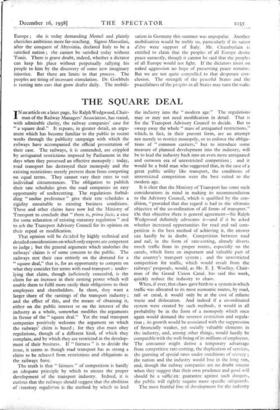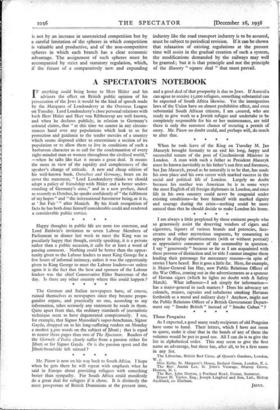THE SQUARE DEAL IN an article on a later page,
Sir Ralph Wedgwood, Chair- ". man of the Railway Managers' Association, has stated, with admirable clarity, the railway companies' case for "a square deal." It repeats, in greater detail, an argu- ment which has become familiar to the public in recent weeks through the publicity campaign with which the railways have accompanied the official presentation of their case. The railways, it is contended, are crippled by antiquated restrictions imposed by Parliament in the days when they possessed an effective monopoly : today, road transport has destroyed their monopoly and the existing restrictions merely prevent them from competing on equal terms. They cannot vary their rates to suit individual circumstances. The obligation to publish their rate schedules gives the road companies an easy opportunity of undercutting. The regulations forbid- ding "undue preference" give their rate schedules a rigidity unsuitable to existing business conditions. These and other claims have now led the Ministry of Transport to conclude that "there is, prima fade, a case for some relaxation of existing statutory regulation" and to ask the Transport Advisory Council for its opinion on their repeal or modification.
That opinion will be de:ided by highly technical and detailed considerations on which only experts are competent to judge ; but the general argument which underlies the railways' claims is of some concern to the public. The railways rest their case entirely on the demand for a "square deal," that is, for an opportunity to compete on what they consider fair terms with road transport ; under- lying that claim, though judiciously concealed, is the claim for an increase in their earning power which will enable them to fulfil more easily their obligations to their employees and shareholders. In short, they want a larger share of the earnings of the transport industry ; and the effect of this, and the means of obtaining it, either on the public interest or on the interest of the industry as a whole, somewhat modifies the arguments in favour of the "square deal." Yet the road transport companies positively welcome the argument on which the railways' claim is based ; for they also must obey regulations, though of a different kind, of which they complain, and by which they are restricted in the develop- ment of their business. If " fairness " is to decide the issue, it seems as though road transport has as strong a claim to be released from restrictions and obligations as the railways have.
The truth is that " fairness " of competition is hardly an adequate principle by which to ensure the proper development of the transport industry. Indeed, it is curious that the railways should suggest that the abolition of statutory regulation is the method by which to lead the industry into the "modern age." The regulations may or may not need modification in detail. That is for the Transport Advisory Council to decide. But to sweep away the whole "mass of antiquated restrictions," which, in fact, in their present form, are an attempt not merely to restrict monopoly, or to enforce the obliga- tions of "common carriers," but to introduce some measure of planned development into the industry, will be to lead the industry back into an even more antiquated and outworn era of unrestricted competition ; and it would be a bold man who suggested that, in the case of a great public utility like transport, the conditions of unrestricted competition were the best suited to the modern age.
It is clear that the Ministry of Transport has some such considerations in mind in making its recommendation to the Advisory Council, which is qualified by the con- dition, "provided that due regard is had to the ultimate objective of the co-ordination of all forms of transport." On that objective there is general agreement—Sir Ralph Wedgwood definitely advocates it—and if it be asked whether increased opportunities for road and rail com- petition is the best method of achieving it, the answer can hardly be in doubt. Competition between road and rail, in the form of rate-cutting, already diverts much traffic from its proper routes, especially on the canals, which form an important and valuable part of the country's transport system ; and the unrestricted competition for traffic, which would result from the railways' proposals, would, as Mr. E. J. Woolley, Chair- man of the Grand Union Canal, has said this week, quickly reduce the industry to chaos.
When, if ever, that chaos gave birth to a system in which traffic was allocated to its most economic routes, by road, rail or canal, it would only be at the cost of infinite waste and dislocation. And indeed if a co-ordinated system were created by such methods, it would in all probability be in the form of a monopoly which once again would demand the severest restriction and regula- tion; its growth would be associated with the suppression of financially weaker, yet socially valuable elements in the industry, and, among other things, would hardly be compatible with the well-being of its millions of employees. The consumer might derive a temporary advantage from competitive rate-cutting, the duplication of services, the granting of special rates under conditions of secrecy ; the nation and the industry would lose in the long run, and, though the railway companies are no doubt sincere when they suggest that their own prudence and good will should be a sufficfen: guarantee against such dangers, the public will rightly require more specific safeguards.
The most fruitful line of development for the industry is not by an increase in unrestricted competition but by a careful limitation of the spheres in which competition is valuable and productive, and of the non-competitive spheres in which each branch has a clear economic advantage. The assignment of such spheres must be accompanied by strict and statutory • regulation, which, if the future of a comparatively new and expanding industry like the road transport industry is to be assured, must be subject to periodical revision. If it can be shown that relaxation of existing regulations at the present time will assist in the gradual creation of such a system, the modifications demanded by the railways may well be granted; but it is that principle and not the principle of the illusory "square deal "that must prevail.















































 Previous page
Previous page